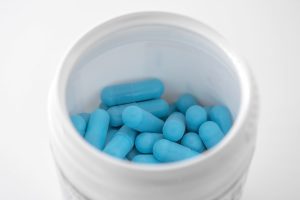There are millions of fungi species, some of which are harmless and live naturally in the human body. However, there are also types of fungi that can cause diseases and infections, particularly on the skin, mouth, or genitals. Fungal infections can be difficult to treat. However, healthcare providers recommend Diflucan for yeast infection in adults and children.
What is Diflucan?
Diflucan is a brand-name prescription medication under the azole antifungal drug class.
The drug’s generic name is fluconazole, available as an injection or intravenous solution, oral suspension, and tablet.
Diflucan is a commonly prescribed treatment for various yeast and fungal infections, particularly candidiasis.
It is a highly effective drug and typically only requires 150 mg to treat most cases of candidiasis.
The drug works by slowing down fungal growth and reproduction.
Diflucan prevents the production of ergosterol, a necessary component for maintaining the integrity of cell walls or membranes.
Without ergosterol, the cell membrane of yeast and fungi cells weakens.
This eventually and effectively leads to the death of the fungi cells.
Uses of Diflucan for Infection
Diflucan is officially indicated for the treatment of the following medical conditions:
Vaginal candidiasis: Doctors recommend a 150 mg dose of Diflucan in tablet form for vaginal yeast or candida.
Oropharyngeal candidiasis: Also referred to as oral candidiasis or simply oral thrush.
Patients generally undergo Diflucan treatment for at least two weeks to lower the likelihood of a relapse.
Candidiasis of the esophagus: A fungal infection of the esophagus or throat, sometimes called esophageal thrush.
Diflucan treatment typically lasts at least three weeks, plus another two weeks minimum after symptoms stop.
Cryptococcal meningitis: Doctors generally recommend 400 mg of Diflucan on the first day and 200 mg daily for the rest of the 10 to 12 weeks of treatment.
Systemic infections of candida: Diflucan is also prescribed for other infections of candida, including pneumonia, disseminated candidiasis, which affects the liver and spleen, and candidemia, a bloodstream infection.
Urinary tract infections: Doctors may prescribe between 50 to 200 mg of Diflucan for adult patients with UTIs and peritonitis.
Diflucan is also a precaution for candidiasis in patients receiving cytotoxic chemotherapy or radiation therapy as they undergo bone marrow transplantation.
Patients with a high risk of developing a significant decrease in their granulocytes should undergo Diflucan prophylaxis at least several days before the expected onset of the condition.

Side Effects of Diflucan
Like all other medications, Diflucan has its share of side effects and potential adverse reactions.
However, the occurrence and severity of Diflucan side effects depend on the dosage taken.
Diflucan’s most common side effects are headaches, nausea, and stomach pain. Other common side effects also include:
- Upset stomach
- Diarrhea
- Vomiting
- Dizziness
- Skin rash, hives, or itching
- Changes in how food tastes
Rare and Serious Side Effects of the Drug
Aside from these common side effects, there are also several rare side effects caused by Diflucan.
Therefore, it is best to consult a doctor immediately if the following side effects are observed or reported.
These include:
- Appetite loss
- Chest tightness
- Fast heartbeat
- Difficulty swallowing
- Fever
- Chills
- Light or clay-colored stool
- Dark urine
- Unusual tiredness or weakness
- Vomiting of blood
- Puffy or swollen eyelids or face
Some studies and patients have reported other unconventional and serious side effects.
The following also warrants an immediate trip to the doctor:
- Loss of bladder control
- Decreased urine
- Painful or difficult urination
- Fainting
- Seizures
- Muscle pain or cramps
- Muscle spasms
- Numbness of the hands, feet, or lips
- Increased thirst
Some rare side effects of Diflucan point towards other more serious conditions and adverse effects.
For instance, the combination of dark urine, light-colored stools, severe itching, and vomiting may indicate liver damage.
In addition, muscle weakness, fatigue, appetite loss, and stomach pain are symptoms of adrenal gland problems.
Meanwhile, fast or irregular heart rate, dizziness, fainting, and seizures indicate torsades de pointes, a severe and potentially fatal heart rhythm condition.
Possible Negative Reactions of Using Diflucan for Yeast Infection
Like many other prescription medications, Diflucan may cause potential negative reactions such as allergies.
Therefore, the drug carries an allergy warning and cautions individuals with a known hypersensitivity to fluconazole or other azoles on taking Diflucan.
In case of a severe reaction, patients are advised to immediately contact their doctor or the local poison control center.
Severe symptoms may require a trip to the emergency room.
Symptoms of an allergic reaction to Diflucan include:
- Skin rash, hives, blisters, or skin peeling
- Shortness of breath
- Coughing and wheezing
- Fever and chills
- Swelling of the face or other body parts
Diflucan also affects people with lower or compromised immunity differently. For example, individuals with HIV, AIDS, or cancer patients undergoing chemotherapy have a higher risk of developing rashes and skin irritation from Diflucan.
How Do You Take Diflucan?
You can safely take Diflucan either with or without prior food intake.
It is available as oral tablets, syrup, and injection or intravenous administration.
Oral tablets and suspension are the most common way of taking Diflucan for candidiasis.
Diflucan tablets are available in amounts of 50 to 200 mg, while the suspension is available in 10 mg/L and 40 mg/L.
The prescribed Diflucan dose varies according to the condition being treated, the severity of the condition, and the age of the patient.
For example, younger children receive a lower recommended dose, although some older kids may have similar doses to adults.
Dosage of Diflucan for Yeast Infection
The recommended Diflucan dosage for candidiasis will depend on the type of infection or where it is located.
The following recommended doses below are all for oral Diflucan tablets.
Vaginal Candidiasis
In general, candidiasis only requires a 150 mg dose of Diflucan.
Yet, this is the most common prescription doctors give patients.
However, certain cases of vaginal infections may require multiple doses of Diflucan.
Patients with complicated or severe yeast infections are also prescribed 150 mg Diflucan tablets but must take it daily for three days.
Recurrent infections require a prolonged Diflucan treatment.
The recommended dosage is 150 mg of Diflucan, but patients must take it daily for 10 to 14 days.
Patients are also prescribed to take 150 mg of Diflucan as weekly maintenance for the next six months.
Esophageal Candidiasis
The recommended Diflucan dosage for infection of the esophagus is a loading dose of 200 mg on the first day.
Following that, the dose is decreased to 100 mg per day.
Diflucan treatment for esophageal thrush is maintained for at least three weeks, plus another two weeks after the infection symptoms have subsided.
Meanwhile, the recommended dosage for kids is a loading dose of 6 mg per kilogram weight on the first day.
This will be followed by 3 mg/kg daily for the same timeframe as the adult recommended dosage.
Oropharyngeal Candidiasis
Like candidiasis of the esophagus, doctors prescribe a loading dose of 200 mg of Diflucan for the first day of treatment.
Patients then take 100 mg of Diflucan once daily.
Although the infection generally resolves within the next several days, patients continue the treatment for a minimum of two weeks to lower the risk of a relapse.
Again, the dosage prescribed for kids is 6 mg/kg as a loading dose and 3 mg/kg daily for the next two weeks.
Candida UTI or Peritonitis
The yeast species Candida is one of the most common causes of fungal UTIs.
The Diflucan dosage for this condition ranges from 50 to 200 mg per day as prescribed by the doctor or until the infection is treated.
Systemic Candida Infections
There has yet to be an official Diflucan dosage for candida pneumonia, candidemia (bloodstream infection), and disseminated infections (liver and spleen).
However, open and noncomparative studies indicate that daily doses of up to 400 mg are promising.
For children with either of these systemic infections, physicians may prescribe between 6 to 12 mg/kg for daily doses.
This dosage is also based on promising results from an open, noncomparative study involving children.
How Long Does It Take for Diflucan To Get Rid of Infections?
Diflucan begins to work almost immediately. It can start to resolve infection symptoms within four hours of intake.
In some uncomplicated cases, Diflucan may resolve the infection in as fast as 16 hours.
However, patients start to see visible signs of the medication working much later.
For example, in mild, uncomplicated cases, the effects of a 150 mg dose of Diflucan on symptoms are typically seen within one to three days.
Patients following treatment plans requiring multiple doses of Diflucan can generally expect improvement in their symptoms within one to two weeks of taking the medication.
Diflucan Overdose
Never take more than the doctors’ prescribed Diflucan dosage.
Taking higher or more frequent doses of Diflucan may lead to overdose.
The following symptoms accompany reports of Diflucan or fluconazole overdose cases:
- Fearfulness
- Suspiciousness or paranoia
- Hallucinations, such as seeing, hearing, or feeling things not there
- Blue tint to the skin
- Decreased breathing
If a Diflucan or fluconazole overdose occurs, it is best to call for emergency assistance immediately.
Symptomatic treatment, supportive measures, and gastric lavage are administered in cases of patient overdose.
Diflucan is largely passed through urination.
Medical professionals may order a three-hour hemodialysis session to hasten the excretion of the drug and decrease plasma levels by half.
Diflucan Precautions
There are several general safety considerations when prescribing and taking Diflucan.
These precautions are generally tied to existing conditions, food, and medications with which Diflucan may have a harmful interaction.
One such precaution is regarding Diflucan and its potential to cause sudden heart death.
In addition, health professionals recommend administering or taking Diflucan with caution if the patient has potentially proarrhythmic conditions.
This is because Diflucan or fluconazole has been linked to prolonging the QT interval or causing a delay in recharge between heartbeats.
It is also advised to take caution when administering or prescribing Diflucan to patients with renal dysfunction.
In addition, adrenal insufficiency has been observed among patients taking azole antifungal medications.
Diflucan Drug Interactions and Contraindications
Oral Diflucan tablets may interact with other drugs or medications, including vitamins and supplements.
These reactions may affect how well the drug works and cause harm.
Diflucan has relative contraindications with several drugs, including:
- Alfuzosin (brand name Uroxatral)
- Citalopram (an antidepressant sold under several brand names, including Celexa)
- Disopyramide (an antiarrhythmic drug)
- Erythromycin stearate (an antibacterial treatment)
- Pentamidine (a medication for Pneumocystis carinii pneumonia)
There are many medications that medical professionals recommend swapping with alternatives to proceed with Diflucan treatment safely.
These include:
- Amiodarone
- Axitinib
- Clozapine
- Doxepin
- Epinephrine
- Lomitapide
- Pimozide
- Tamoxifen
- Tacrolimus
- Xanax
Taking Diflucan at the same time as certain medications may not result in serious health complications. Instead, it raises the risk of experiencing side effects associated with the other drug.
These include:
Warfarin: Diflucan may increase the likelihood of bruising, nosebleeds, and blood in urine or stools.
Glyburide and Glipizide: Diflucan may increase the risk of low blood sugar, sweating, chills, and fast pulse.
Theophylline: Diflucan may increase the likelihood of side effects like kidney damage.
Methadone and Fentanyl: Diflucan may increase the risk of drowsiness, confusion, and slower breathing.
Zidovudine: Diflucan may raise one’s chances of experiencing headaches, appetite loss, nausea, and vomiting.
Vitamin A: According to one case report, taking Diflucan with all-trans-retinoic acid, an acid form of vitamin A, can potentially cause pseudotumor cerebri or false brain tumors.
These are only some of the many drugs that may cause unwanted interactions with Diflucan.
Therefore, disclosing any current medications or treatments during doctor’s checkups for this infection is always best.
This will help avoid unnecessary and avoidable harmful effects of the drug.
Diflucan Food Reactions
Diflucan has no reactions with food.
Patients can safely take the medication before or after meals without worrying about severe reactions.
There are also no harmful effects whether patients take the Diflucan tablet whole, cut it, or crush it to mix with their food or drink.
Diflucan and Pregnancy
Health professionals caution pregnant women against Diflucan treatments.
There is no evidence indicating any increased risk of congenital anomalies in the fetus when exposed to low or standard doses of Diflucan during pregnancy.
However, there is evidence suggesting otherwise with high doses.
One study notes that taking Diflucan while pregnant may raise the risk of miscarriage.
However, a separate study reported that spontaneous abortion between seven and 22 weeks of pregnancy was more common among women who ingested Diflucan during their pregnancy.
Diflucan and Lactation
Low levels of Diflucan are found in the breast milk of lactating women who received a 150 mg dose of the medication.
Although health experts recommend exercising caution on taking Diflucan while breastfeeding, no concrete evidence indicates that doing so poses any danger to the baby.
A survey of breastfeeding women who received regular fluconazole doses for Candida of the breasts showed no serious reactions among the breastfed infants.
Diflucan Cautionary Labels
Diflucan comes with several warnings regarding certain health conditions, aside from pregnancy and lactation.
In addition, Diflucan may worsen some pre-existing conditions, such as:
Kidney disease: Taking Diflucan may cause patients to develop issues in their adrenal glands.
However, findings show that this may be reversible upon ceasing drug intake.
Liver problems: Diflucan may cause or increase the likelihood of liver failure.
Similar to its effects on the kidney or adrenal glands, the problems may be reversible after stopping the Diflucan treatment.
Abnormal heart rhythm: Diflucan can affect the QT intervals or prolong the time for the heart’s electrical system to recharge between heartbeats.
This can greatly increase the risk of torsades de pointes, a life-threatening heart rhythm condition.
Hypersensitivity to azoles: Patients with known allergies or hypersensitivity to fluconazole and other azoles are advised to avoid taking Diflucan.
Who Shouldn’t Take Diflucan?
Pregnant women are advised not to take Diflucan.
The Centers for Disease Control and Prevention recommends that pregnant women and potentially pregnant women only use topical antifungal medications for treating vulvovaginal yeast infections.
Individuals with liver problems are also advised to avoid Diflucan.
Continuing to take Diflucan despite existing liver issues and excessive alcohol drinking can result in liver failure.
The case can potentially be severe enough to need a liver transplant.
Anyone with existing heart conditions may also need to refrain from taking Diflucan since the medication may increase the risk of arrhythmia or heart rhythm problems.
People allergic to fluconazole and other azole antifungal drugs are also advised not to take Diflucan.
Insisting on taking Diflucan may result in difficulty breathing and life-threatening anaphylaxis.
Frequently Asked Questions
Normally, yes. A dose of Diflucan is typically all that’s needed to cure yeast infections, including non-recurrent Candida vaginitis.
However, Diflucan generally does not completely cure recurrent cases of vaginal candida infection.
For example, a study in 2002 indicated that a two-dose Diflucan therapy was ineffective for women with recurrent infections. The same study notes, though, that severe or complicated cases of vaginal infections still respond well to treatments of Diflucan.
Doctors typically prescribe multiple doses of Diflucan for up to two weeks as treatment for recurrent vaginal candidiasis.
Diflucan effectively kills yeast and prevents its growth by damaging its cell membrane. It creates holes in the membrane, which causes the contents of the cells to leak out and the fungi cells to die.
Diflucan does this by inhibiting the enzyme that synthesizes or produces ergosterol. Without this vital component, yeast and fungi cell membranes become more vulnerable and permeable.
This results in killing off the yeast and fungi cells. Although it starts working within one day of taking it, patients receiving Diflucan usually start seeing signs of improvement only after three days.
No. Unfortunately, Diflucan is not effective for treating fibromyalgia. As such, a single dose of the treatment is neither prescribed by doctors nor recommended even for off-label use.
Diflucan is indicated only as an antifungal medication. It is typically prescribed for yeast infections, which cause symptoms, including painful urination.
Although fibromyalgia may also exhibit painful urination and chronic pelvic pain as symptoms, the condition is not caused by a fungal infection.
Diflucan is an antifungal medication. It may not be effective in treating small intestinal bacterial overgrowth or SIBO.
However, it may be a potential treatment for small intestinal fungal overgrowth or SIFO. Please note that although using Diflucan for yeast infection may help treat SIFO, it may not completely alleviate certain gastrointestinal symptoms.
These may include bloating, constipation, and indigestion.
Diflucan does not interact with alcohol, nor does alcohol make the medication less effective. As such, it is generally safe to drink alcohol even on the same day you take a dose of Diflucan or fluconazole.
However, take note that drinking alcohol weakens the immune system. This means it can increase your risk of experiencing common Diflucan side effects, such as stomach pain, nausea, and diarrhea.
In addition, excessive alcohol intake while taking fluconazole may also cause liver damage.





